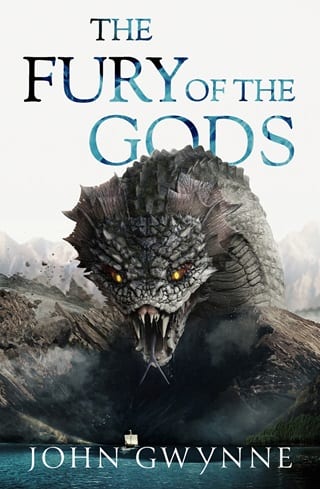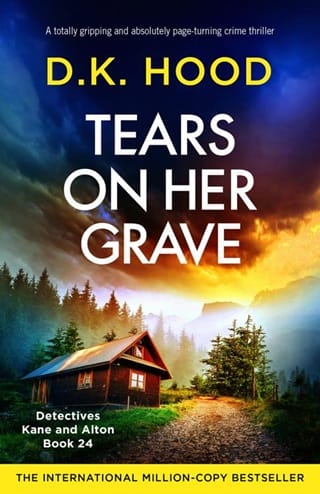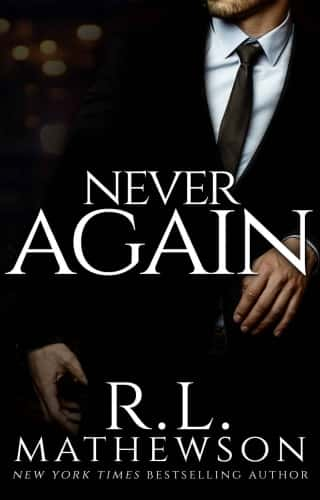CHAPTER FIFTY BIÓRR
CHAPTER FIFTY
BIóRR
B iórr walked among the dead, and threaded his way through the destruction, searching. Here and there flames still licked and crackled, though most were doused or burned out now, leaving the black-charred carcasses of wagons behind, looking like long-dead skeletons of some unknown, forest-dwelling creatures. People were all around him, going through burned-out wagons as they searched for anything that had survived the flames. Any barrels or chests that were still intact were being heaved out and set in piles. The rustling of forest litter in the shadows and Biórr spun on his foot, raising his shield and hefting his sword, but it was just a spertus, legs scuttling as it slipped into a stream with hardly a splash. He studied the deeper shadows, wary of another attack, but saw nothing. Skraeling and tennúr were all around now, and he saw trolls wading through the shadowed undergrowth.
They will not be back now, there are too many of us here, and we are ready. He slipped his shield over his back and sheathed his sword, put his hands to his mouth and shouted.
"FAIN," he called, and strode on through the devastation, walking past a cluster of seared wagons, some of the beams still smouldering, and then he saw him.
Red Fain was walking through the ash-covered ground, carrying a child in his arms. Biórr ran to him.
"Thank the dead gods," Biórr breathed as he reached Fain. The old man was covered in black streaks of ash, and there was a long cut on his forearm, but he gave Biórr a hard grin.
"Take more than a few nieing goat-humpers to send me onto the soul road," Fain said.
"Well, I know that," Biórr said, taking the child from Fain's arms. It was a girl named Aila. She was unconscious, thick with ash, her breathing steady.
"This way," Fain said and led Biórr around a curve in the road, and he saw them, a score or so children, huddled around a small fire, a pot suspended over it. Some of the children were lying down, others tending to them, cleaning wounds, giving them water to drink. Some stood guard with oversized shields and spears, or axes. Harek called out as he saw Biórr and Fain.
Biórr laid Aila down on a bed of rough-cut branches, a lad coming over with a linen cloth and a bucket of water. He knelt beside Aila and started washing the ash from her face.
"I was about to come looking for you," Harek said to Fain. "I thought …" he stuttered to a halt.
Fain scowled. "Seems like everyone round here thinks I can't look after myself," he grunted. His face softened and he tousled Harek's red hair. "You need not worry about me, lad. I'm not going anywhere. How are they all?" he asked, looking at the wounded.
"All right, I think," Harek said. He twisted round to look at another lad who sat with his knees hunched up. Biórr realised it was Bjarn. "No thanks to your nieing friends," Harek snarled at him.
The lad scowled up at Harek and stood slowly, Biórr surprised to see how broad and thick-limbed Bjarn was becoming.
"Shut up," Bjarn snarled, his fists balling, and Biórr saw the flicker of green in his eyes.
"Enough of that," Fain said, stepping between them. "No fighting." He pointed a finger at them both. "There is enemy enough without fighting among ourselves."
"He is the enemy," Harek grunted.
"No, lad, he is not," Fain said. "Bjarn is just … confused."
"What's to be confused about? We are fighting those that try to thrall us, it is simple enough," Harek muttered.
"I am thralled here, the same as you," Bjarn said. "Even though I do not wear the collar I am kept a prisoner, not allowed to go. We all are." He glowered at Fain. "No different from a thrall."
"The difference, Bjarn," Biórr said, stepping close to the lad, "is that we do this to keep you safe. The people we fight, they will thrall you to be their tool. They will treat you like an animal, no different from a hound, or a good milking goat. All they see is your usefulness, how you could serve them, make their lives better."
"And I was taken to be used by you Raven-Feeders, we all were," Bjarn said. "You used us to cast your Seier-spell and set Lik-Rifa free. You didn't ask us. We weren't given a choice . How is that any different?"
Biórr just looked at Bjarn, had nothing to say to that.
"I want to go back to my family," Bjarn said. "My mother. Those Bloodsworn, they were going to take me to her."
"Your mother is a thrall," Biórr said. "A powerful thrall, but still a thrall. She is of use to Elvar and the Battle-Grim. If you went to them, you would become a thrall, too."
"You do not know that," Bjarn said, "and, anyway, if I am free, like you keep saying, then it would be my choice to make. Stay or go." He looked from Biórr to Fain. "Can I go?"
They did not answer him. Bjarn took a step towards the road.
"Stop," Fain growled.
"Exactly," Bjarn said, stopping and glaring at Fain. "You are no different from a slaver, no better," and he turned and walked away, sat down away from the rest of them.
"Don't listen to him, he is a halfwit nieing ," Harek growled. "We all know what you have done for us. We are grateful."
Biórr shook his head, remembering the Bjarn he had first met, remembered playing tafl with him in the inn at Snakavik.
"Give him time," he said to Harek, then he looked at Fain. "Let me see that cut on your arm."
Biórr sat upon a stump and sipped from a horn of mead while he listened to Lik-Rifa's captains.
They were seated in a wide glade, long shadows stretching as the sun sank below the treeline, a fresh- scraped fire pit burning. Lik-Rifa sat with Rotta beside her, Ilska and Drekr on her other side, listening as her captains reported to her: Krúsa of the skraeling, a huge bull troll called Heein, leaning on a club the size of a small tree and wearing a cloak of bearskins stitched together, Tannbursta of the tennúr, a spertus whose name Biórr could not pronounce, the petty jarls sworn to Lik-Rifa, Glunn Iron-Grip and Sigrún among them, and a handful of mercenary captains, Sterkur death-in-the-eye and others.
All of them were talking of the night raids. They had suffered the worst casualties on the first night; since then their guard and vigilance had increased, but the war-host was spread along such a distance that the guards were stretched too thin, and each night had seen new attacks and new casualties.
"Some of the mercenary bands have deserted," Ilska reported, her voice flat and emotionless.
"What?" Lik-Rifa growled, low and chilling.
"How many of these bands have deserted?" Rotta asked Ilska.
"Two, my lord," Ilska said.
"They will regret that," Lik-Rifa hissed. "Have they gone to my brother?"
"No," Ilska said. "Following their tracks, they are headed north, out of the Iron Wood."
"When this war is done, I will track them down for you, my queen," Drekr said.
"Thank you," Lik-Rifa said. "Try to bring as many of them back to me alive as you can."
Biórr shivered at that.
"Heein will squash them for Mother-Maker," the troll said, his voice deep as a fjord. "Heein will turn them to gruel."
"How good of you," Rotta said.
"Food is also low, my queen," Ilska said, continuing her report.
"Perhaps Heein can find these runaways soon, then," Rotta smiled. "Ilska, how much food do we have left?" he asked.
"Three days, perhaps four," Ilska said.
"Tannbursta, how long until we reach my brother's lair?" Rotta asked the tennúr.
"Two days until we reach the wolf-den," Tannbursta said.
"That is fine then," Lik-Rifa said. "We have more than enough."
"Not if we have to undergo a siege," Rotta explained. "It may take a while to dig Ulfrir out of his hole."
"We will not be at Wolfdales long," Lik-Rifa said.
"Why—" Rotta began, but Lik-Rifa cut him off with a raised hand and a dark look.
"If needs be I shall hunt for you," Lik-Rifa said. "I will not see those loyal to me go hungry." She waved a hand, dismissing the subject. "Is there anything else?"
"Yes, my queen," Ilska said.
"What?" Lik-Rifa asked. It was clear that she did not want to be talking of logistics, of food shortages and desertions.
"More Tainted have joined us."
"Excellent," Lik-Rifa said.
"Make sure that they are fed and cared for, given clothes and war gear, if they are needed," Rotta said.
"Yes, do that, of course," Lik-Rifa said.
"And Ilska," Rotta said, "if any have my blood, bring them to me later."
A tennúr winged down from the darkness and alighted upon Rotta's shoulder. It leaned and whispered in his ear.
"Ilska, is there anything else to discuss?" Lik-Rifa asked.
"No, my queen."
"Good," Lik-Rifa said and stood. "Two days, and then," she gave an unsettling smile, her sharp teeth too large for her mouth, "my brother shall regret being reborn into this new world. Into my world. I long to tear him into lifeless strips." She licked her lips with a long, serpent-like tongue. "I will not forget your loyalty, all of you. You shall be well rewarded. Now, if that is all, go to your people, your kin, and be ready for Ulfrir's rabble. They will undoubtedly come again tonight, though he is too weak or too scared to join them."
The glade emptied and Biórr stood to leave.
"Not you, Biórr," Rotta said, and he sat back down.
"Munni brings news, my sister," Rotta said.
"What news?" Lik-Rifa asked.
"This Elvar has built gates and towers, a wall around Wolfdales."
"Perhaps I shall pay these towers a visit. I will smash them to kindling," Lik-Rifa sneered.
"I am sure you will," Rotta said.
"This Elvar. Who is she to think that she can stand against a god?" Lik-Rifa snarled. Biórr could see the rage building within her. She turned her gaze on him, which he found uncomfortable. "You know this Elvar, Biórr, how does she dare?"
"She was always … ambitious, my queen," Biórr said. "She rose high in the Battle-Grim, and quickly. She is a fine warrior, too, has good weapons craft. But to become chief of the Battle-Grim, to resurrect and thrall Ulfrir, to return to Snakavik and slay her father," he blew out a breath and shook his head. "She has surprised me. Shown she has deep-cunning, too. She is a jarl's daughter, grew up in his court, and Jarl St?rr was known for his cunning and his ruthlessness. He had an arrogance, as if he were fated to rule, and no doubt Elvar has inherited some of that from him."
"More than her father would have hoped, I imagine," Rotta smiled, "considering what she did to him."
"If this woman is so formidable, why are you smiling?" Lik-Rifa growled.
"Because knowledge is power, and I know something," Rotta said.
"What?" Lik-Rifa said.
"Patience, my sister."
"I have been patient for three hundred years," Lik-Rifa said, her voice cold, a tremor in it.
"True, true," Rotta said placatingly. "Our friends at Wolfdales have told Munni that not all love this Elvar. That there are some among her followers who are … disappointed with her leadership. And they have told Munni that if Elvar were to die, perhaps the doors of Wolfdales would be open when we arrived."
"And how will Elvar die, when we are here and she is there? Will our friends there kill her for us?"
Rotta smiled.
 Fullepub
Fullepub 



